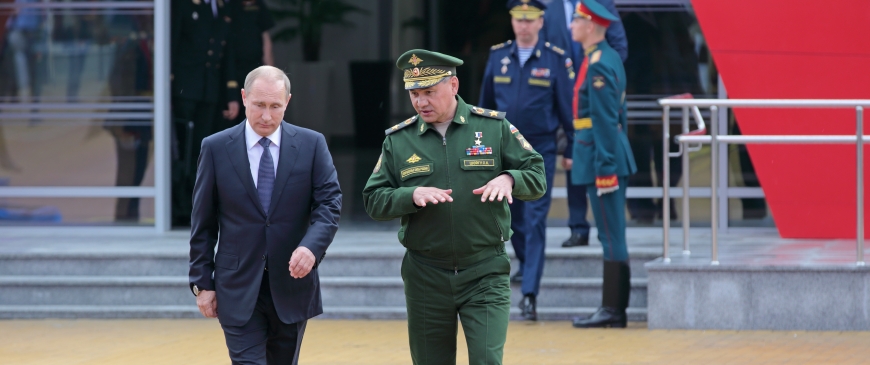
How the Kremlin sees the rest of the world
Russian analysts reckon the US will be less focused on intervening around the world and will be more nationalist, mercantilist and interest-focused.
Thomas Hobbes described the life of a man as “solitary, poor, nasty, brutish and short”. The Kremlin’s view of the world is dark and Hobbesian. But on a recent visit to Moscow, I was struck by the confidence of influential Russians in their country’s ability to thrive in such a world.
Approval ratings for Vladimir Putin have fallen to just above 60 per cent, their lowest level since Russia’s intervention in Ukraine in 2014, but he is unchallenged domestically. Everyone expects the president to stay in charge at least until his current term ends in 2024, and probably for longer. The economy, though still dependent on natural resource exports and unable to grow at more than 1.5 per cent a year, continues to muddle along.
Much of the Kremlin’s self-confidence stems from the belief that the Western world is changing in ways that suit Russia. Donald Trump is seen to represent a long-term trend in the US rather than a short-term blip: Russian analysts reckon that the US will be less focused on intervening around the world to uphold a liberal, rules-based, US-led order, and that it will be more nationalist, mercantilist and interest-focused. So in the long run, the US and Russia should be able to accommodate each other.
Russians think Europe is undergoing a similar transformation. The successes of Viktor Orbán, Marine Le Pen, Nigel Farage and Matteo Salvini herald a new Europe that, like Russia, will seek to sustain family values and Christianity, while confronting Islamic extremism. Chastened by its foolish support for democracy in places such as Libya and Syria, this Europe will not fuss much over human rights. Though some European leaders still pontificate about European principles and the rule of law, they are – in the cynical view of many Russians – not serious about them.
Russians note that Trump and Putin share an illiberal world-view that values the pursuit of national interest and disdains multilateralism. Both dislike sanctimonious lectures from Angela Merkel. But the difference, they say, is that while Trump, coming from the business world, is an optimist who sees problems as fixable, Putin, with an intelligence background, has a more paranoid vision. He believes in conspiracies and sees international relations as a zero-sum game.
Russian analysts report that key figures in the Kremlin talk of war with the West as a real possibility. Russia’s economy may be small, they say, but it could inflict blows through “asymmetric” or hybrid warfare – thus Russia would avoid fighting where its opponent was strong, and play to its strengths such as cyber-warfare and the manipulation of information via social media.
Some Russians claim that they could win militarily through concentrating their efforts in a few places and by acting decisively and forcefully. They point out, for example, that Russia has achieved much more in Syria with limited resources than the US ever achieved in Iraq, with all the billions that it spent there. They think they have enough money to develop new weapons – such as the hypersonic cruise missiles at which Russia excels – that will deter the West from attacking. Of course, many senior Russians know that their country would be crazy to contemplate a hot war with the West, but the militaristic braggadocio serves a purpose in sustaining morale.
Several well-placed Russians believe that Europe’s increasingly “realist” world-view, combined with its deteriorating relationship with the US, will spur it to seek friendship with Russia. They say Europe will need Russia in order to avoid being squeezed between America and China.
Because Russian leaders do not take human rights and the rule of law very seriously, they find it hard to understand that others do so. But as became clear at a seminar I attended in Moscow (organised by the Club of Three, which brings together British, French and German politicians and business people), some senior Europeans (including Germans) will be reluctant to rebuild bridges with Russia so long as it defies international law by occupying Crimea and parts of the Donbass.
Nobody in Moscow expects either Putin or Volodymyr Zelensky, the new Ukrainian president, to make the compromises required to resolve the Donbass conflict any time soon. It suits the Kremlin for Russians to regard the chaos in Ukraine as a warning of what happens when a Russian-speaking country seeks to embrace Western-style democracy. But some Moscow think-tankers recognise that the conflict saddles Russia with strategic costs, including poor relations with the EU and the sanctions that curtail its access to foreign credits, investment and technology.
Putin’s friendship with Xi Jinping, and the fact that Russia and China are probably closer than at any previous time in their history, reinforces the self-confidence in Moscow. Russians believe that the Chinese share their world-view and that the two countries strengthen each other vis-à-vis the US. They note that the US’s confrontational attitude to both is driving them together.
But Russians also describe the relationship with China as a marriage of convenience and are wary of becoming dependent on an economic giant. One reason Russian analysts keep returning to the question of a closer EU-Russia relationship is that they want to be able to play the Europeans and Chinese against each other to increase their freedom of manoeuvre.
Russians are right to point out that 20 years ago many Western leaders made the mistake of thinking that history was ending, as the world seemed to move towards democracy, globalisation and multilateralism. But some Russians may now be guilty of a similar hubris, in assuming that the Western world will be driven by nationalism and identity politics and that it will forget its values.
Charles Grant is director of the Centre For European Reform.
